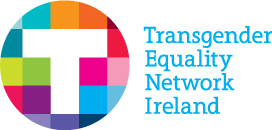TENI
TENI and University of Limerick Research Highlights Educational Inequalities Facing Transgender Youth
Press Release
Tuesday, 25th August 2020
New research by Transgender Equality Network Ireland (TENI) and University of Limerick (UL) has highlighted the educational inequalities transgender and gender diverse youth face in school settings.
The study shows that that transgender and gender diverse youth in Ireland feel marginalised within post-primary schools, which inhibits them coming out and affects their academic attainment.
The report, the first ever study of the post-primary school experiences of transgender youth, was a collaboration between TENI and researchers based in the School of Education, UL.
Co-authored by UL’s Irish Research Council Fellow and Marie Curie Fellow, Dr Ruari-Santiago McBride, the 72-page report, The Post-Primary School Experiences of Transgender and Gender Diverse Youth in Ireland, is based on 18 months of research, a number of workshops and over 50 interviews with transgender and gender diverse youth, parents, educators and stakeholders from education bodies, unions and the public sector.
It was co-funded by the Irish Research Council and Marie Skłowdowska-Curie Actions as part of the Collaborative Research Fellowships for a Responsive and Innovative Europe (CAROLINE) programme.
Dr McBride explained: “This report builds on, and aims to enhance, the vital work that TENI has been undertaking across Ireland’s education sector since 2013. The goal of the research was to provide an in-depth understanding of the educational challenges that transgender and gender diverse youth face in Ireland and to determine policy and practice recommendations that will help us reduce the educational inequalities they experience.”
Vanessa Lacey, Health and Education Manager for TENI, added that “TENI have been supporting young trans people in schools, their parents and the schools themselves for the last decade and are delighted to be associated with this research. The findings speak to the many challenges that young trans people experience in the school environment and we hope this report will instigate meaningful engagement between the Department of Education and key stakeholders. We are looking forward to being central to this process.”
The report highlights:
- Transgender and gender diverse youth feel marginalised within post-primary schools and that this inhibits them from coming out and detrimentally effects their well-being and academic attainment
- The majority of transgender and gender diverse youth disclosed their gender identity to armed their gender identity and facilitated their transition, which
gave them a sense of acceptance and that their best interests were being recognised. However some, transgender and gender diverse youth disclosed their gender identity to a member of school staff who invalidated their gender identity and obstructed their transition, which left them feeling discriminated against because of their gender identity - The majority of transgender and gender diverse youth reported that they transitioned from their birth-assigned sex to their self-determined gender identity while attending post-primary school. Yet, without exception transgender and gender diverse youth who transitioned during their post-primary schooling reported experiencing challenges as a result
- Key transition challenges encountered by transgender and gender diverse youth included: misnaming and misgendering; restrictive uniforms, bathroom accessibility, staff prejudice, peer bullying, barriers to sports, and, a lack of support
Dr McBride said: “The research findings suggest that transgender and gender diverse youth do not have equality of educational opportunity in Irish post-primary schools. The transgender and gender diverse youth we spoke to made a wealth of recommendations regarding the changes they believed schools needed to introduce to be supportive of transgender and gender diverse youth. This included making the school curriculum more inclusive of gender identity and gender expression as well as reviewing their uniform policy and provision of gender-neutral facilities. Moreover, transgender and gender diverse youth stressed the importance of school staff affirming transgender
and gender diverse youth’s identity by using their preferred name and pronoun.
Dr McBride further outlined: “There is also the need for proactivity at the level of national policy. In order to ensure schools become more inclusive of gender diversity there is the need to establish a National Gender Identity and Gender Expression in Education Working Group, which would involve participation of all relevant education stakeholders.
“This Working Group should be provided with the resources by government to develop a National Gender Identity and Gender Expression Policy and Procedures for Schools to guide educators in providing wrap-around support to trans and gender diverse students and working to make their schools more inclusive-spaces. If this is achieved we can begin to reduce the educational inequalities transgender and gender diverse youth face and work towards ensuring they have equality of educational opportunity,” said Dr McBride.
ENDS/
Link to communication video: https://youtu.be/u3xKAfsDMf4
Link to full report: https://teni.ie/reports/
For further information, please contact:
Vanessa Lacey
TENI
0851477166
vanessa@teni.ie
About Transgender Equality Network Ireland
TENI is a non-profit organisation supporting the trans community in Ireland. TENI seeks to improvethe situation and advance the rights and equality of trans people and their families. Our Vision is an Ireland where trans people are understood, accepted and respected, and can participate fully in all aspects of Irish society.
More information is available at www.teni.ie
Tweet @TENI_Tweets
https://www.facebook.com/TransEquality
Dr Ruari-Santiago
School of Education
University of Limerick
0899620827
Ruari.mcbride@ul.ie / ruari.mcbride@gmail.com / @ruarimcbride
About University of Limerick
The University of Limerick is an independent, internationally focused university with 16,500 students and 1,700 staff. It is a young, energetic and enterprising university with a proud record of innovation in education and excellence in research and scholarship.
More information is available at www.ul.ie.
Tweet @UL
Facebook.com/universityoflimerick
LinkedIn University of Limerick
Snapchat U of Limerick

